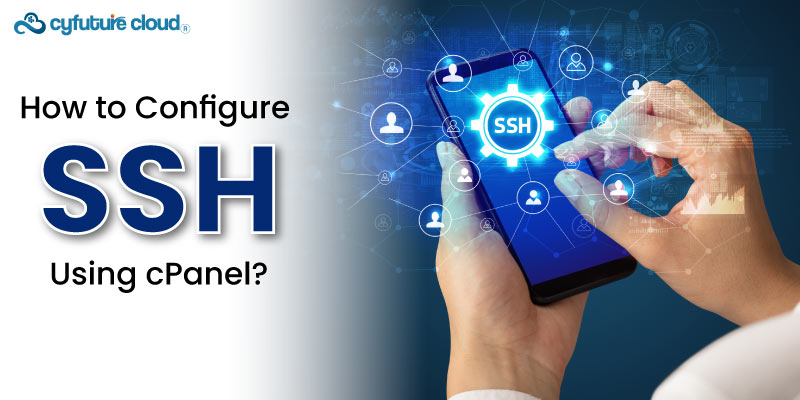 Server
Colocation
Server
Colocation
 CDN
Network
CDN
Network
 Linux Cloud
Hosting
Linux Cloud
Hosting
 VMware Public
Cloud
VMware Public
Cloud
 Multi-Cloud
Hosting
Multi-Cloud
Hosting
 Cloud
Server Hosting
Cloud
Server Hosting
 Kubernetes
Kubernetes
 API Gateway
API Gateway


The Secure Shell (SSH) network protocol encrypts all data, including passwords, to effectively safeguard data in transit over insecure networks. It enables the establishment of a secure connection between a local computer and a distant server. SSH also allows remote login, command execution, and other network-related functions.
Configuring SSH is recommended for the following reasons:
SSH encryption provides a very secure means of data transfer between a local and remote server. All traffic, including login credentials like passwords, is encrypted using secure cryptographic protocols. This keeps private information from being hacked or intercepted by other parties when it's being transferred over unprotected networks, such as the internet.
By turning on SSH, you can defend yourself from online dangers like man-in-the-middle attacks, which may steal passwords and other important information. Because SSH communication channels employ robust encryption techniques, it is very difficult for attackers to decipher any data that is captured. This adds a critical layer of security for remote server access over public networks.
SSH allows accessing the command line interface of a remote server securely from anywhere. System administrators can connect to servers remotely to perform administrative tasks, maintenance, troubleshooting server issues or outages, software upgrades, configuration changes etc. This remote server access enables centralized management of geographically distributed IT infrastructure. Server teams can resolve critical issues promptly by logging in remotely via SSH instead of needing physical access to data center servers. The secure SSH tunnel allows them to operate on the live production server from their own computer without compromising security.
SSH enables automation of repetitive tasks on remote servers. Tools like Ansible, Puppet or Chef use SSH to automate server configuration, deployment, patching, backups and other maintenance. Sysadmins are able to create scripts that automatically run commands over SSH from a distance. The time and effort that would otherwise be required to manually do menial administrative duties are freed up by this automation. Additionally, automation lowers the possibility of human mistake and promotes uniformity in server settings. SSH-based automation improves efficiency for IT teams managing large server fleets.
In summary, configuring SSH access provides critical security, flexibility and productivity benefits for server management. It is considered a best practice for any server environment.
1.) Access cPanel - Type the cPanel URL into your web browser to access your cPanel login page. Next, to log in, enter your cPanel username and password.
2.) Scroll down and click on "Security Credentials" under the Advanced section - The Security Credentials area is usually located towards the bottom of the cPanel homepage. Under the "Advanced" category, click on "Security Credentials".
3.) Switch to the "SSH Access" tab - This tab contains all the options to manage SSH keys and access. Click on the tab to open the SSH configuration interface.
4.) Select the "Manage SSH Keys" area to create, import, or remove SSH key pairs. To access the key administration page, click "Manage SSH Keys".
5.) To produce a new public/private key pair for SSH authentication, click the "Generate New Key Pair" button. The key pair will be stored in cPanel and used for logging in.
6.) Enter a key name and click "Generate Key" - Choose a name to identify this key pair. It's helpful to use your computer name or username. Click "Generate Key" to create the pair.
7.) Copy the public key - Expand the generated key pair by clicking on the name. This will show the public and private key content. Copy the public key which will be added to the remote computer.
8.) Login to the remote computer - Access the computer you want to use for connecting to the server via SSH. This could be your local desktop or a separate server.
9.) Create ~/.ssh/authorized_keys file - If the.ssh folder isn't already there, create it in the home directory of the remote machine. Make a file named authorized_keys after that.
10.) Paste the public key in authorized_keys - Paste the public key content copied earlier into the authorized_keys file. Save the file.
11.) Set permissions - Run chmod 600 ~/.ssh/authorized_keys to set the right file permissions. This secures the key file.
12.) Import private key in cPanel - Back in cPanel, go to SSH Access > Manage SSH Keys > Import Key Pair. Paste the private key content here and import it.
13.) Enable SSH access - Expand SSH configuration and enable SSH access or restrict it as per your policy.
14.) Click "Save" - Finally click "Save" for the changes to take effect. SSH access using the key pair is now ready.
SSH access is now configured for that user account in cPanel. Use the private key from the remote computer to log in via SSH. The key-based authentication enhances security. Follow best practices for using strong passwords and limiting access.

Let’s talk about the future, and make it happen!
By continuing to use and navigate this website, you are agreeing to the use of cookies.
Find out more


